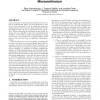Free Online Productivity Tools
i2Speak
i2Symbol
i2OCR
iTex2Img
iWeb2Print
iWeb2Shot
i2Type
iPdf2Split
iPdf2Merge
i2Bopomofo
i2Arabic
i2Style
i2Image
i2PDF
iLatex2Rtf
Sci2ools
119
click to vote
FPGA
2006
ACM
2006
ACM
Application-specific customization of soft processor microarchitecture
A key advantage of soft processors (processors built on an FPGA programmable fabric) over hard processors is that they can be customized to suit an application program's specific software. This notion has been exploited in the past principally through the use of application-specific instructions. While commercial soft processors are now widely deployed, they are available in only a few microarchitectural variations. In this work we explore the advantage of tuning the processor's microarchitecture to specific software applications, and show that there are significant advantages in doing so. Using an infrastructure for automatically generating soft processors that span the area/speed design space (while remaining competitive with Altera's Nios II variations), we explore the impact of tuning several aspects of microarchitecture including: (i) hardware vs software multiplication support; (ii) shifter implementation; and (iii) pipeline depth, organization, and forwarding. We...
Related Content
| Added | 22 Aug 2010 |
| Updated | 22 Aug 2010 |
| Type | Conference |
| Year | 2006 |
| Where | FPGA |
| Authors | Peter Yiannacouras, J. Gregory Steffan, Jonathan Rose |
Comments (0)

